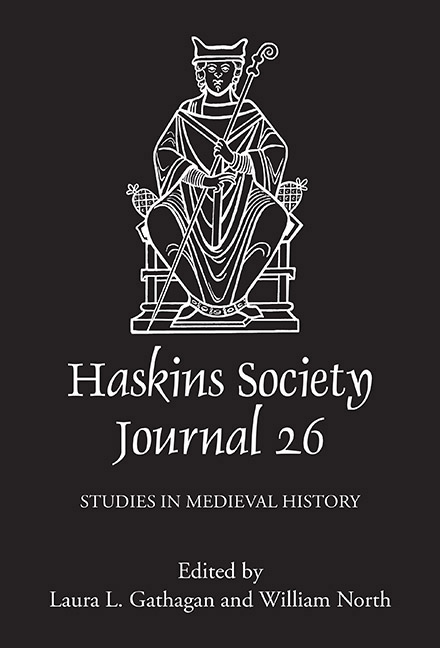Book contents
- Frontmatter
- Contents
- List of Figures
- Editors’ Note
- Abbreviations
- 1 Mores Tuos Fabricae Loquuntur Building Activity and the Rhetoric of Power in Ostrogothic Italy
- 2 A Hermeneutical Feast: Interreligious Dining in Early Medieval Conciliar Legislation
- 3 A Hypothetical Slave in Constantinople: Amalarius’s Liber Officialis and the Mediterranean Slave Trade
- 4 Welsh Kings at Anglo-Saxon Royal Assemblies (928–55)
- 5 The Diplomatics of Depredation: Reconsidering Holy Trinity Caen’s List of Losses
- 6 When Did Robert of Torigni First Receive Henry of Huntingdon’s Historia Anglorum, and Why Does It Matter?
- 7 A Coin Bearing Testimony to Duchess Matilda as Consors Regni
- 8 Fighting to be the Tallest Dwarf: Invidia and Competition in the Self-Conception of Eleventh- and Twelfth-Century Masters
- 9 Brut y Tywysogion: the History of the Princes and Twelfth-Century Cambro-Latin Historical Writing
- 10 The Use of English Annalistic Sources in Medieval Welsh Chronicles
- 11 A Franco-Danish Marriage and the Plot against England
6 - When Did Robert of Torigni First Receive Henry of Huntingdon’s Historia Anglorum, and Why Does It Matter?
Published online by Cambridge University Press: 25 May 2021
- Frontmatter
- Contents
- List of Figures
- Editors’ Note
- Abbreviations
- 1 Mores Tuos Fabricae Loquuntur Building Activity and the Rhetoric of Power in Ostrogothic Italy
- 2 A Hermeneutical Feast: Interreligious Dining in Early Medieval Conciliar Legislation
- 3 A Hypothetical Slave in Constantinople: Amalarius’s Liber Officialis and the Mediterranean Slave Trade
- 4 Welsh Kings at Anglo-Saxon Royal Assemblies (928–55)
- 5 The Diplomatics of Depredation: Reconsidering Holy Trinity Caen’s List of Losses
- 6 When Did Robert of Torigni First Receive Henry of Huntingdon’s Historia Anglorum, and Why Does It Matter?
- 7 A Coin Bearing Testimony to Duchess Matilda as Consors Regni
- 8 Fighting to be the Tallest Dwarf: Invidia and Competition in the Self-Conception of Eleventh- and Twelfth-Century Masters
- 9 Brut y Tywysogion: the History of the Princes and Twelfth-Century Cambro-Latin Historical Writing
- 10 The Use of English Annalistic Sources in Medieval Welsh Chronicles
- 11 A Franco-Danish Marriage and the Plot against England
Summary
In this article, I seek to shed new light on a question which, to date, has been little more than a subtle chronological debate amongst historians. Previous studies have left little room for doubt that Robert of Torigni consulted Henry of Huntingdon's Historia Anglorum (referred to hereafter as HA) for the composition of his own magnum opus, the Chronica. There is, however, much less certainty as to when, precisely, Robert first received a manuscript copy of Henry's work at the monastery of Le Bec in Normandy. Was it in 1139, the year in which Henry temporarily ceased his work in order to accompany Archbishop Theobald of Canterbury on a mission to the European mainland? Or was it several years later, when Henry had long since resumed his work on the HA, causing it to evolve into an even more substantial historical narrative? And why does it matter? Finding an answer to these questions – however esoteric they might at first appear – promises to produce knowledge the significance of which extends beyond the intertextual relationship between Henry's HA and Robert's Chronica. By identifying the precise dynamics of Robert's interaction with Henry, as well as the logistics and channels of communication which connected the two historians and their works, I aim to offer an innovative lens through which to investigate similar texts and contexts in a wider chronological and geographical framework. ‘Intertextuality’, in this context, will be showcased not merely as a theoretical, but rather as a practical concept for the study of medieval historiography.
I commence this study by challenging the prevailing notion that Robert was presented with a copy of the HA as early as 1139. Instead, I produce evidence to suggest a later date, one closer to Robert's appointment as prior of Le Bec in 1149. My argument consists of three strands, represented here as three thematic sections. Each of these sections focuses on a separate yet related piece of evidence which previous scholarship has considered indicative of an earlier date of composition than the one argued for here. First, I analyse and compare different narrative accounts which testify to Robert's involvement with the HA.
- Type
- Chapter
- Information
- The Haskins Society Journal 262014. Studies in Medieval History, pp. 143 - 168Publisher: Boydell & BrewerPrint publication year: 2015
- 4
- Cited by



